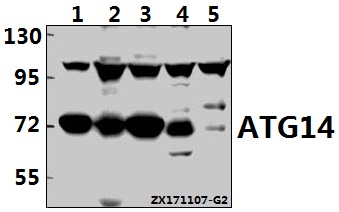Product Name :
ATG14 polyclonal antibody Background :
Atg14 (ATG14 autophagy related 14 homolog), also known as BARKOR (beclin 1-associated autophagy-related key regulator) or ATG14L, is a 492 amino acid protein that contains 3 coiled-coil domains in its N-terminal region. Conserved in chimpanzee, canine, bovine, mouse, rat, chicken, zebrafish, fruit fly and mosquito, Atg14 exhibits highest expression in brain and lowest expression in kidney and ovary. Atg14 localizes to isolation membranes of forming autophagosomes, cytoplasm, endoplasmic reticulum and an uncharacterized punctate structure. Necessary for both basal and inducible autophagy, Atg14 plays a role in autophagosome formation and MAP1LC3/LC3 conjugation to phosphatidylethanolamine. Atg14 promotes BECN1 translocation from the trans-Golgi network to autophagosomes, and forms a complex with BECN1, PI 3-kinase p100 and p150. Atg14 does not form complexes with KIAA0226/Rubicon or UVRAG, which forms a mutually exclusive complex with BECN1 through direct competition with Atg14. Product :
Rabbit IgG, 1mg/ml in PBS with 0.02% sodium azide, 50% glycerol, pH7.2 Storage&Stability :
Store at 4°C short term. Aliquot and store at -20°C long term. Avoid freeze-thaw cycles. Specificity :
ATG14 polyclonal antibody detects endogenous levels of ATG14 protein. Immunogen :
Recombination protein, corresponding to amino acids 152-406 of Human ATG14. Conjugate :
Unconjugated Modification :
Unmodification
ATG14 polyclonal antibody Background :
Atg14 (ATG14 autophagy related 14 homolog), also known as BARKOR (beclin 1-associated autophagy-related key regulator) or ATG14L, is a 492 amino acid protein that contains 3 coiled-coil domains in its N-terminal region. Conserved in chimpanzee, canine, bovine, mouse, rat, chicken, zebrafish, fruit fly and mosquito, Atg14 exhibits highest expression in brain and lowest expression in kidney and ovary. Atg14 localizes to isolation membranes of forming autophagosomes, cytoplasm, endoplasmic reticulum and an uncharacterized punctate structure. Necessary for both basal and inducible autophagy, Atg14 plays a role in autophagosome formation and MAP1LC3/LC3 conjugation to phosphatidylethanolamine. Atg14 promotes BECN1 translocation from the trans-Golgi network to autophagosomes, and forms a complex with BECN1, PI 3-kinase p100 and p150. Atg14 does not form complexes with KIAA0226/Rubicon or UVRAG, which forms a mutually exclusive complex with BECN1 through direct competition with Atg14. Product :
Rabbit IgG, 1mg/ml in PBS with 0.02% sodium azide, 50% glycerol, pH7.2 Storage&Stability :
Store at 4°C short term. Aliquot and store at -20°C long term. Avoid freeze-thaw cycles. Specificity :
ATG14 polyclonal antibody detects endogenous levels of ATG14 protein. Immunogen :
Recombination protein, corresponding to amino acids 152-406 of Human ATG14. Conjugate :
Unconjugated Modification :
Unmodification
-
 Western blot (WB) analysis of ATG14 pAb at 1:1000 dilution Lane1:H1792 whole cell lysate(20ug) Lane2:HEK293T whole cell lysate(40ug) Lane3:HepG2 whole cell lysate(40ug) Lane4:C6 whole cell lysate(40ug) Lane5:AML-12 whole cell lysate(40ug)
Western blot (WB) analysis of ATG14 pAb at 1:1000 dilution Lane1:H1792 whole cell lysate(20ug) Lane2:HEK293T whole cell lysate(40ug) Lane3:HepG2 whole cell lysate(40ug) Lane4:C6 whole cell lysate(40ug) Lane5:AML-12 whole cell lysate(40ug)
Bioworld Biotech only provide peptides for our antibodies and do not provide additional peptide customization services.
Price/Size :
USD 368/1mg/vial
Tips:
For phospho antibody, we provide phospho peptide(0.5mg) and non-phospho peptide(0.5mg).Describe :
Blocking peptides are peptides that bind specifically to the target antibody and block antibody binding. These peptide usually contains the epitope recognized by the antibody. Antibodies bound to the blocking peptide no longer bind to the epitope on the target protein. This mechanism is useful when non-specific binding is an issue, for example, in Western blotting (WB) and Immunohistochemistry (IHC). By comparing the staining from the blocked antibody versus the antibody alone, one can see which staining is specific; Specific binding will be absent from the western blot or IHC performed with the neutralized antibody.Formula:
Synthetic peptide was lyophilized with 100% acetonitrile and is supplied as a powder. Reconstitute with 0.1 ml DI water for a final concentration of 10 mg/ml.The purity is >90%,tested by HPLC and MS.
Storage:
The freeze-dried powder is more stable. For short time at 2-8°C. For long term storage store at -20°C.
Note :
This product is for research use only (RUO only). Not for use in diagnostic or therapeutic procedures.
 ATG14 polyclonal antibody
ATG14 polyclonal antibody  Datasheet
Datasheet COA
COA MSDS
MSDS SHIP
SHIP